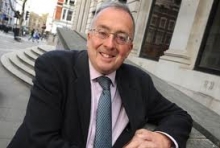Stephen Bubb

Our ‘influential reader’ in this edition is Stephen Bubb, Chief Executive of the Association of Chief Executives of Voluntary Organisations. He can be contacted at stephen.bubb@acevo.org.uk.
I have chosen three books that mean a lot to me. They are rather eclectic or even esoteric choices but I hope they make a wider point about my approach to philanthropy.
My first choice is T.S. Elliot’s The Four Quartets, published in 1944, and arguably some of the finest poetry in the English language. It contains some of the most musical and unforgettable passages in 20th century poetry. Its four parts present a meditation on the spiritual, philosophical and personal themes that preoccupied the author. There are four particular lines taken from the end of Little Gidding that have stayed with me:
“We shall not cease from exploration
And the end of all our exploring
Will be to arrive where we started
And know the place for the first time”
For me those lines sum up the constant need for learning, development and being open, rather than taking things for granted. Philanthropy, in part, is a desire to explore and to help others explore, learn and develop. The wellspring of philanthropy is not accepting the world as it is, but wanting to contribute, in our own way, to developing a better world. Exploration is the antithesis of the status quo. Those who give do so because they reject the status quo and want change.
My second choice is The Book of Common Prayer, which was compiled by Archbishop Cranmer in 1662. Despite the many attempts to suppress its use, most Anglican churches will still have one service using this version because the magic and majesty of Cranmer’s English is timeless and has yet to be bettered by modern scribes. For example, what can be both more chilling and exciting than the words of the General Confession:
“We have erred and strayed from thy ways like lost sheep. We have followed too much the devices and desires of our own hearts.”
In the Communion service Cranmer provides a series of sentences to be used at the time of the collection where, as he writes, “the Church Wardens shall receive the alms for the poor and other devotions of the people”.
One of these is particularly pertinent for philanthropists, especially at this current time: “Charge them who are rich in this world that they be ready to give, and glad to distribute.”
Finally, on a lighter note, I have always thoroughly enjoyed Brideshead Revisited by Evelyn Waugh.
That is perhaps a curious choice in the context of philanthropy as it deals with the lives of gilded youth at Oxford and beyond, and may be the opposite of philanthropic as its celebrates self-indulgence and the aristocracy. But I like it so much because it reminds me of the three years I spent in Oxford at Christ Church, the college that featured so prominently in Brideshead and with characters clearly based on exotic Christ Church undergraduates from the time Evelyn Waugh spent at Hertford.
It is at University that one develops the interests and inspiration for future life and where I became clear that my career path was not destined in the private sector but in sectors where I could make a difference and a contribution. They also formed my individualistic approach to leadership, which has helped me to build ACEVO into the national force it is today.
We should remember that these major Oxford colleges are the results of generous philanthropic donations. Much of the continued work of the university only takes place through the gifts of prominent benefactors, the latest of which at Oxford includes the Saïd Business School and Michael Moritz’s recent £25m donation to my alma mater. Philanthropy has always been allied to the pursuit of learning and the advancement of art, learning and science, which brings me back to those marvellous lines of TS Elliot about exploration.




